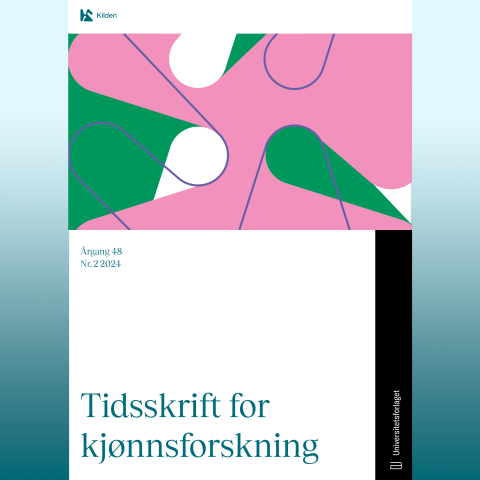The Journal of Gender Research: Open issue

This year's second issue of the Journal of Gender Research is an open issue. The common denominator for the articles is a fundamentally critical project. Through close reading of contemporary texts, discourse analysis and rhetorical analysis of texts from recent history, the articles provide perspectives on both historical and current debates in gender research: the disciplining of the body, controversies within feminism, as well as sexist and racist structures that affect the living conditions of individuals and groups. The articles illustrate how tools from the feminist and anti-racist toolbox can be used to understand these themes and phenomena both in the present and in the past.
DOI: 10.18261/issn.1891-1781
Abstracts
“Become a few kilos prettier!”
A Critical Discourse Analysis of Early 1970s Representations of the Body in the Magazine Hjemmet
By Hilde Berit Moen
This article examines representations of body and gender at the onset of the 1970s. It was during this period that issues surrounding eating disorders began to emerge and establish themselves to the extent we recognize today. This era also marked the onset of late modernity’s detraditionalization and individualism. This article raises the question of what characterizes the condition of the female body in this specific historical period. The article explores understandings of the body and its condition during this era through a critical discourse analysis of the column “Hjemmets slankeservice” (“Hjemmets slimming service”), as well as advertisements, reports, and announcements in 25 issues of the magazine Hjemmet from the year 1973. The results indicate that the primary readers of the column were girls and young women. Five discourses are central in the texts: a diet discourse, a beauty discourse, a health discourse, a moral discourse, and a control discourse. The column and other materials in the magazine together represent a conception of the body as without room for variation or alternative understandings of body shape and weight. The moral imperative to achieve “the thin body ideal” is legitimized and emphasized through references to standardized body measurements for the “normal”.
Keywords: body, culture, late modernity, eating disorders, quantification, discipline, critical discourse analysis
Sommers versus Friedman: Feminism, personal attacks and the American culture war, 1990–1992
By Simon Gramvik
Christina Hoff Sommers is a fascinating figure for anyone interested in feminist polemics. Her most famous work Who Stole Feminism? has been referred to as the most influential anti-feminist book of the 90s. This article explores the philosopher’s entry into the national gender debate in the United States based on a three-year polemic against the philosopher Marilyn Friedman. Previous research has shown how Sommers’s rhetoric is characterized by logical errors and personal attacks. In the feminist narrative of the American culture war, Sommers figures as both a feminist imposter and an accomplice in a conservative backlash. In this article, I explore how the philosopher’s experiences and political motivations were shaped through conflict. I use rhetorical theory and argumentation theory to show how reciprocal personal attacks functioned as an engine in feminist polemics. The conclusion is that Sommers’s rhetoric should be understood in terms of its original context. Thus, in this article I advocate for the value of a dynamic understanding of how interpersonal and institutional factors influence professional and political debate.
Keywords: women’s studies, conservative feminism, standpoint feminism, radical feminism, polemics, ad hominem, gender politics, freedom of speech, antifeminism, postfeminism, media feminism, backlash
Times were different back then: Klaus Rothstein’s Den sorte mand (The Black Man) and anti-woke as a political project
By Mathias Danbolt og Lene Myong
In recent years, Black researchers and artists have worked on establishing critical studies in Blackness as a research field in Danish and Nordic academia. But Black and racially minoritized researchers are not alone in researching Blackness. In 2023, the white Danish literary critic Klaus Rothstein published Den sorte mand. Racisme, woke og hvidhed i dansk litteratur (The Black Man. Racism, woke and whiteness in Danish literature), which examines Blackness as a motif in Danish literature from the 18th century to the present. In this article, we analyze how concepts including anti-black racism, anti-racism and “wokeness” are operationalized in the study. We argue that Rothstein’s claim on the importance of “witnessing” – and thus reproducing – anti-black racism enables the construction of a white liberal non-racist position, characterized by a deep skepticism towards contemporary forms of anti-racism that are presented as both dangerous and destructive. We read Den sorte mand as part of a broader movement of political anti-wokeness, which has gained a strong foothold in the Nordic public sphere in recent years. The article shows that the normalization and intellectualization of anti-wokeness contributes to the delegitimization of research into Blackness and anti-racism, and works to reconfigure the tradition for normalizing and exonerating anti-black racism in a Nordic context.
Keywords: racism, anti-black racism, Blackness, anti-woke, literature